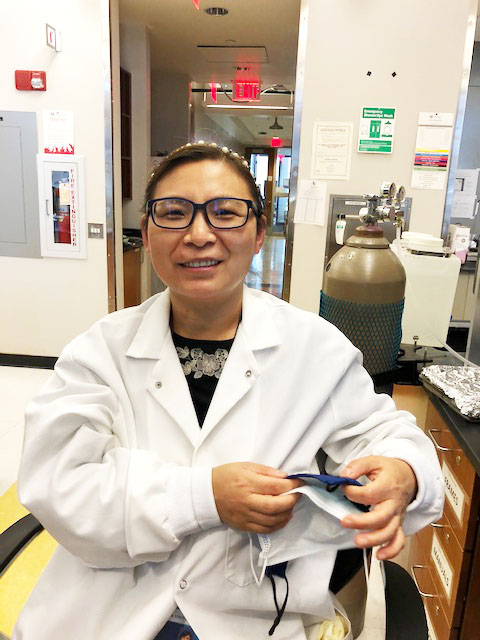Dimitrios Moskofidis, MD/PhD
(A.K.A. Demetrius Moskophidis)
Professor, Medicine
Professor, Biochemistry and Molecular Biology
Professor, Graduate Studies
Member, Molecular Oncology and Biomarkers Program
Chaperone Biology and Metabolism Research Group
The scope of our research includes studies on immune regulation, microbial (viral) pathogenesis and inflammation as well as studies on protein homeostasis and molecular chaperone biology/function. These are areas of great medical importance and there is reasonable expectation that this research will continue to provide the rationale to develop novel strategies to prevent, and perhaps more effectively treat, viral infectious diseases as well as patients with cancer and with age-related neurodegenerative diseases.
The Dimitrios Moskophidis Lab
Health Sciences Campus
Georgia Cancer Center - M. Bert Storey Research Building
1410 Laney-Walker Blvd., CN-3143, Augusta, GA 30912
(706) 721-8738
The primary focus of research in my laboratory, over the past two decades, has been to investigate microbial (viral) pathogenesis and immunology/inflammation, as well as mechanisms of protein homeostasis and molecular chaperone biology. The specific research areas can be summarized as follows:
This research area involves the study of cellular processes via which molecular chaperones and heat shock transcription factors (HSFs) mediate the host response to environmental stress and the role of these processes in human diseases such as cancer. Using genetically manipulated (knock-in and knock-out) mouse models and employing metabolic, proteomic and genomic methods we probe the basic mechanisms, by which the HSP70 and HSP90 chaperone machineries, in the endoplasmic reticulum (GRP78, GRP170, SIL1, GRP94), cytoplasm (HSP70, HSC70, HSP25), and mitochondria (GRP75), impact the progression of human metabolic diseases, cancer and neurodegeneration. Our work provided proof-of-concept information to demonstrate that the ability of the evolutionary conserved Heat Shock Transcription factors (HSFs) and particularly HSF1 to promote malignant cell transformation resides in its ability to stimulate transcription of mRNAs that encode proteins regulating adaptive energetic and metabolic pathways. Targeting inactivation of HSF1 interferes with the anabolic malignant state and is an effective strategy for prevention and therapy of several cancer types. Notably, this important research is the result of a long-term collaboration with Dr. N. Mivechi at the Georgia Cancer Center.
Persistent viral infections create conditions for long-term pathologic consequences in human populations. A specific focus of my laboratory has been to elucidate the mechanisms by which viruses persist and escape immune surveillance. This research is important for our understanding of viral pathogenesis and for the development of measures to control and eliminate such infections and the diseases they cause. Our have provided proof-of-concept that:
Eroglu B, Pang J, Jin X, Xi C, Moskophidis D*, and Mivechi N.F.*. (2020). HSF1-mediated control of cellular energy metabolism and mTORC1 activation drive acute T cell lymphoblastic leukemia progression (*corresponding authors) Mol. Cancer Res. 18:463-476. PMID:31744878.
Eroglu B, Jin X, Deane S, .ztürk B, Ross OA, Moskophidis D*, Mivechi N.F.*. (2022). Dusp26 phosphatase regulates mitochondrial respiration and oxidative stress and protects neuronal cell death. (*corresponding authors) Cell. Mol. Life Sci. 2022 Mar 21;79(4):198. PMID: 35313355.
Pircher H, Moskophidis D, Rohrer U, Burki K, Hengartner H, Zinkernagel RM. (1990). Viral escape by selection of cytotoxic T cell -resistant virus variants in vivo. Nature. 346:629-633.
Aebische T, Moskophidis D, Rohrer UH, Zinkernagel RM, Hengartner H. (1991) In vitro selection of lymphocytic choriomeningitis virus escape mutants by cytotoxic T lymphocytes. Proc Natl Acad Sci USA. 88:11047-1151.
Moskophidis D, Laine E, Zinkernagel RM. (1993). Peripheral clonal deletion of antiviral memory CD8+ T cells. Eur J Immunol.23: 3306-3311.
Moskophidis D, Lechner F, Pircher H, Zinkernagel RM. (1993). Virus persistence in acutely infected immunocompetent mice by exhaustion of antiviral cytotoxic effector T cells. Nature. 362:758-761.
Moskophidis D, Lechner F, Hengartner H, Zinkernagel RM. (1994). MHC class I and MHC-linked capacity for generating an antiviral CTL response determines susceptibility to CTL exhaustion and establishment of virus persistence in mice. J Immunol.152: 4976-4983.
Moskophidis D, Zinkernagel RM (1995). Immunobiology of cytotoxic T cell escape mutants of lymphocytic choriomeningitis. J Virol. 69: 2187-2193.
Moskophidis D, Kioussis D. (1998). Contribution of virus-specific CD8+ cytotoxic T cells to virus clearance or pathologic manifestations of influenza virus infection in a T cell receptor transgenic mouse model. J Exp Med. 188:223-232.
Huang L, NF Mivechi, D Moskophidis. (2001). Insights into regulation and function of the major stress-induced hsp70 molecular chaperone in vivo: Analysis of mice with targeted gene disruption of the hsp70.1 or hsp70.3 genes. Mol Cell Biol. 21:8575-8591.
Zhou S, Ou R, Huang L, Price G, Moskophidis D. (2004). Differential tissue-specific regulation of CD8+ T cell mediated immune response during chronic viral infection. J Virol. 78:3578-3600.
Huang L, Min JN, Masters S, Mivechi NF, Moskophidis D. (2007). Insights into function and regulation of small heat shock protein 25 (HSPB1) in a mouse model with targeted gene disruption. Genesis. 45:487-501.
Jin X, Moskophidis D*, Mivechi NF*. (2011). Heat shock transcription factor 1 is a key determinant of HCC development by regulating hepatic steatosis and metabolic syndrome. Cell Metabolism. 14:91-103. (*corresponding authors)
Xi C, Y., Hu, P. Buckhaults, D. Moskophidis, and N.F. Mivechi (2012). Heat shock factor Hsf1 cooperates with ErbB2 (Her2/Neu) protein to promote mammary tumorigenesis and metastasis. J Biol. Chem. 287:35646-35657.
Eroglu, B., M. Jin-Na, Y. Zhang, Szurek, E., D. Moskophidis, Ali Eroglu, and N.F. Mivechi. (2014). Genetic Interaction Between Heat Shock Transcription Factor Binding Protein 1 (HSBP1) and BRG1 Component of the Wnt Signaling Pathway During Early Embryonic Development. Dev. Biol. 386:448-460.
Qiao, A., X. Jin, J. Pang, D. Moskophidis*, and Nahid F. Mivechi*. (2017). The transcriptional regulator of the chaperone response HSF1 controls hepatic bioenergetics and protein homeostasis. Journal Cell Biology 216: 723-741 (*corresponding authors).
Jin X, Qiao A, Moskophidis D*, Mivechi N.F*. (2018). Modulation of Heat Shock Factor 1 Activity through Silencing of Ser303/Ser307 Phosphorylation Supports a Metabolic Program Leading to Age-Related Obesity and Insulin Resistance. Mol. Cell. Biol. 38: e00095-18. (*corresponding authors).
Cho W-H, Jin X, Pang J, Wang Y, Mivechi, N.F.*, and Moskophidis D*. (2019). The Molecular Chaperone HSP70 Controls Liver Cancer Initiation and Progression by Regulating Adaptive DNA-Damage and MAPK/ERK Signaling Pathways (*corresponding authors). Mol. Cell. Biol. 39: e00391-18.
NIH 2 R01 CA132640, NIH 2 R01 CA062130, NIH 1 R01 AI55774.


